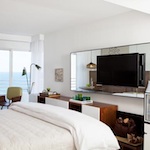At a Glance
Location
Denver
Founded
1978
Employees
55
Specialty
Installation of glass and aluminum
Annual Sales
More than $10 million
When Louis Sigman became president of Horizon Glass in 2006, he had already been working in the industry for more than 25 years, and he had learned the hard way that while “booms are terrific, busts are equally horrific.” He endured his first economic downturn in the late 1980s, and he has experienced two more since then, including the one in 2008, which he says was the worst by far. By then, he knew what patterns to watch out for in a decline: “The leading [indicator industries]—housing, automotive, retail—felt the pain in 2008 and 2009, but it took several more years to trickle down to us.”
After navigating a rough 2010 and 2011, though, Horizon rebounded in 2012, and it’s anticipating an even more prosperous 2013; Sigman attributes the company’s weathering of the storm to several factors. “We’ve always been locally owned, and I represent just the second generation of ownership,” he says. “We are also positioned in our market region as a truly full-service company that can handle any size job.” It’s this third factor that seems the most key.
These days, Horizon Glass takes great pride in its broader suite of services, which it has worked to expand significantly over the years. The company now furnishes, fabricates, and installs glass products as well as architectural aluminum curtainwalls, storefronts, and entrances in thousands of commercial and residential structures.
Top 4 Glass and Aluminum Products Offered by Horizon Glass
1. Blast-rated windows. Manufactured by Graham Architectural Products, these windows are designed for safer performance in the event of an explosion.
2. Electrochromic glass. Also called “smart glass,” this material from SAGE Electrochromics tints at certain voltages to admit different amounts of light.
3. Architectural aluminum systems. Horizon’s metal curtain walls, storefronts, and entrances are manufactured by EFCO and Kawneer.
4. Insulated glass. This material, designed to help maximize a building’s efficiency, is manufactured by Oldcastle Building Envelope and Viracon.
Sigman says he is just as appreciative of a $200 order as he is of a $2 million contract. “We want to be able to fill any need a client may have, from minor repairs to large construction,” he says. “We are indeed committed to providing the best total service product possible, and service and small contract work is the perfect complement to our larger projects.”
The majority of Horizon’s work is nonresidential construction, and most recently its projects have predominantly consisted of health-care facilities and new school spaces, both K–12 and collegiate, including classroom buildings, student learning areas, living quarters, recreation centers, and research facilities.
“Higher education, in particular, has been very good to us during the economic slump and has been a big contributor in helping us keep things going,” Sigman says. “The commercial office space, hospitality, and retail sectors have been slower, but we hope those industries will rebound soon.”
Because of its industry, Horizon remains reliant on architectural trends, but Sigman points out that current design trends are incorporating more glass. “The great thing about glass is that architects know they can use it as a signature on their designs—it is more difficult to create something visually noteworthy out of concrete or masonry,” he says. “Today, we can design [and] build some real razzle-dazzle work using glass and architectural aluminum while also providing a superb and high-performance building envelope.”
As the economy heals, Sigman also hopes Horizon can undertake more LEED-certification projects. The company already has three LEED Platinum-certified projects under its belt, along with several Gold and Silver certifications as well. “We haven’t seen as many LEED projects in the past couple of years, but we’ll be ready as they hopefully reemerge,” he says. “We can meet the LEED needs of any clients, from incorporating aluminum via recycled content to glass performance to practicing green protocols in the field.”
Sigman is the first to admit that his company’s path to success has not been as smooth as, well, its featured product. “One thing about our particular industry—it is a roller coaster ride,” he says with a chuckle. “It can be thrilling, but it can also make you want to throw up your lunch.” However, after three decades of diversifying its capabilities, Horizon can now claim a firm foothold. ABQ



